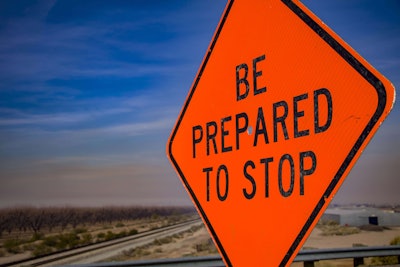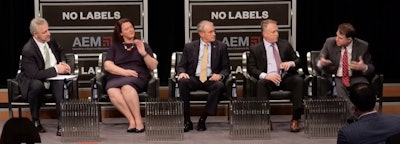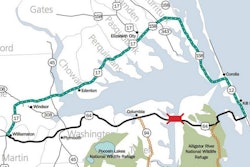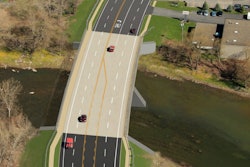
 Ed Mortimer, right, with U.S. Chamber of Commerce, discusses the need for a long-term infrastructure package, with an AEM and No Labels panel.
Ed Mortimer, right, with U.S. Chamber of Commerce, discusses the need for a long-term infrastructure package, with an AEM and No Labels panel.Supporters of legislation to bolster the nation’s infrastructure see a window of opportunity that could close in a matter of months if Congress does not act.
Congressmen on a bipartisan panel February 8 said that if an infrastructure bill does not make it out of the House in six months, it probably won’t get passed this year. That’s because election campaigning will be ramping up, distracting political leaders’ attention from the less exciting topic of fixing and improving America’s roads, bridges, water, sewer, broadband and power systems.
“If it’s not done by mid-year, it’s not going to happen,” said U.S. Rep. John Katko (R-New York), who supports an infrastructure bill.
Panelists were cautiously optimistic though, especially if the White House lends its support, that an infrastructure bill could pass this year. House Democrats have expressed a willingness to introduce infrastructure legislation.
The panel was sponsored by the Association of Equipment Manufacturers and No Labels, a nonprofit, grassroots organization that seeks to help end the country’s political gridlock on pressing issues. A second panel was composed of business leaders.
The most pressing need at the moment, they said, is to fund the Fixing America’s Surface Transportation (FAST) Act. The act is a major source of road funding for state and local governments and is set to expire in 2020. Panelists feared that failure to fund the program would result in piecemeal allocations that prevent transportation agencies from committing to long-term road and bridge projects.
Another concern is making sure the nation’s Highway Trust Fund is fully funded. The fund is derived primarily from the nation’s gas and diesel taxes and is expected to become insolvent by 2028 without action.
Tom Davis, co-founder of No Labels and the panel’s moderator, summed up the current situation facing Congress this way:
“People love infrastructure, but they want someone else to pay for it.”
Panelists noted that the federal gas tax hasn’t been raised since 1993 and that the gas tax in general is becoming an outdated method of raising revenues. Electric cars, overall fuel efficiency and ever-growing vehicle travel by Americans mean roads wear out faster and the gas tax brings in less revenue in comparison.
But for the short-term, a gas tax increase is needed, they said.
The U.S. Chamber of Commerce is backing a 25-cent hike to help fund immediate needs. But it and others are also looking to long-term funding sources, such as a vehicle mile tax, in which drivers are taxed on the miles driven rather than for fuel.
Panelists noted, though, that increasing the gas tax will meet resistance in Congress, especially a year after making hefty reductions in personal and business income taxes.
U.S. Rep. Kurt Schrader (D-Oregon) said that the situation requires everyone paying, that includes electric car drivers and others who are using roads but not paying as much or anything in gas taxes. A user fee, they say, would be a fairer option. Public-private partnerships should also be encouraged.
During a second panel discussion, Ed Mortimer, chamber vice president of transportation and infrastructure, said it is a matter of American competitiveness, as China and other countries make major infrastructure improvements in their countries.
Davis said infrastructure funding would also bolster the U.S. economy and keep it growing in the coming years.
Katko said that, over all, an infrastructure bill will take courage from political leaders, even if it means they may not win re-election.
“This job is not endowed to you as a lifelong commitment,” he said. “Do your job.”
Allison Black, chief economist for the American Road & Transportation Builders Association, said conditions were ripe for bill passage, with the White House having proposed an infrastructure plan and House Democrats willing to introduce legislation. “Hopefully, the Senate will come along,” she said.
“This is such an important part of our economy,” she added. “We need to make these investments for the future.”
She and other panelists called on citizens to contact their congressional representatives and senators to support an infrastructure bill.
Mortimer said the U.S. Chamber has made it the organization’s top priority and would be ranking elected officials on how they act – or don’t act – on the issue.
“The business community is energized and ready to go on this issue,” he said.
Stephen Roy, president Americas for Volvo Construction Equipment, agreed, saying the business community needs to lead the effort to educate the public and elected leaders.
“This is not a hard sell,” he said.











